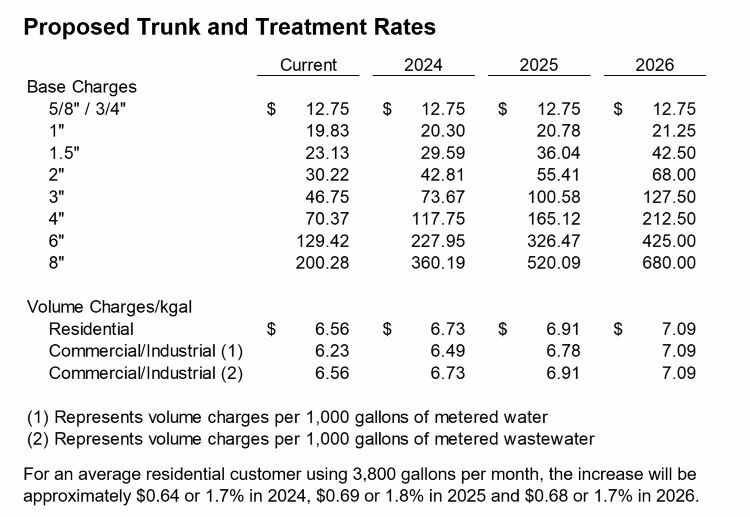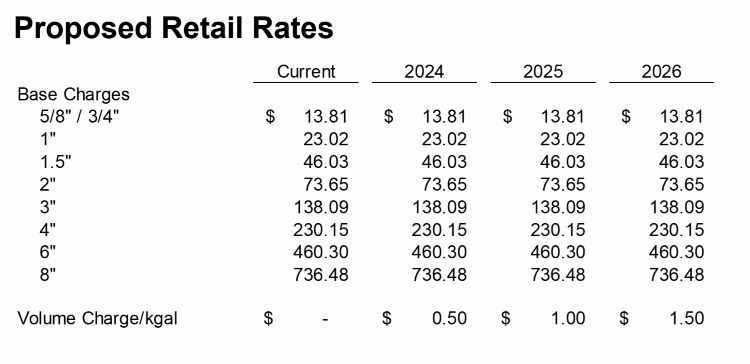FOR IMMEDIATE RELEASE:
Tuesday, July 25, 2023
Customers across all sectors of ReWa’s service area—residential, commercial, and industrial—will notice a slight increase in their bills beginning in early 2024.
These adjustments, pending approval of ReWa’s Board of Commissioners in a vote scheduled for late August, represent the first phase of a three-year process to create a more equitable and affordable rate structure for our entire customer base. Small, additional increases are scheduled to occur annually in 2025 and 2026, as well.
The proposed structure is based on a rate study performed by an independent third party.
For an average residential customer using 3,800 gallons per month, the increase will be approximately $0.64 or 1.7 percent in 2024, $0.69 or 1.8 percent in 2025, and $0.68 or 1.7 percent in 2026. The increases will be reflected in February 2024 bills.
A full view of the rates follows at the bottom of this summary.
Wastewater bills contain both base and volume charges. As part of our equity and affordability rate strategy, ReWa is transitioning to a uniform volume rate for all customers by 2026.
This proposed three-year suite of small increases is a component of a tiered rate transition process that ReWa first launched in 2022. The goal? To drive equity in ReWa’s rate structure through a shift from a single, static base charge for all customers to base charges determined by the size—and potential flows—of individual water meters.
Approximately 96 percent of ReWa’s nearly 160,000 customers have 5/8” inch meters—the smallest size available. The remaining four percent of customers have larger meters and will pay slightly higher base charges that are reflective of the potential for increased flows that ReWa must be prepared to serve.
An affordability analysis conducted by a third party confirmed the proposed structure meets affordability criteria, utilizing both median household income (MHI) and the lowest quintile income (LQI).
Further, the Consumer Price Index (CPI) has increased at a much faster pace than ReWa’s rates. If our rates increased with the CPI, monthly wastewater fees would be 13.7 percent, or $5.34, higher for the average residential customer.
Our rates allow us to cover our operating expenses, annual debt service and to pay cash for a portion of our capital expenditures while meeting financial policy metrics and strategic goals, in addition to ensuring environmental protections, public health, and the local economy.
As a self-funded organization that does not receive tax revenue, ReWa calculates its rates to ensure both maximum affordability for our customers while providing ReWa with the ability to manage its operating and capital needs, all while maintaining nearly 400 square miles of critical wastewater infrastructure.
A public hearing before the ReWa Board of Commissioners will be held on Monday, August 28, at 1:30 p.m. to allow customers to express their views regarding the proposes rate changes.
Public Hearing Details:
- Date: Monday, August 28
- Location: ReWa, Administrative Building, Board Room, 561 Mauldin Road, Greenville, SC 29607
- Time: 1:30 p.m.
- For questions: contact Rebecca Steifle, Senior Executive Administrator, at rebeccas@re-wa.org, or (864) 299-4000, ext. 264.
ABOUT RENEWABLE WATER RESOURCES (ReWa): Since 1925, Renewable Water Resources (ReWa) has been committed to providing high-quality wastewater treatment services to the Upstate of South Carolina while promoting a cleaner environment, protecting public health and the water quality of Upstate waterways, and developing the necessary sewer infrastructure to sustain our community and growing economy. With nine water resource recovery facilities and more than 350 miles of pipe, we serve a broad geographic area, including Greenville County and portions of Anderson, Laurens, Pickens and Spartanburg Counties. Each day an estimated 42 million gallons of water passes through our trunk lines and reclamation facilities before being cleaned and returned to our area rivers and streams.

